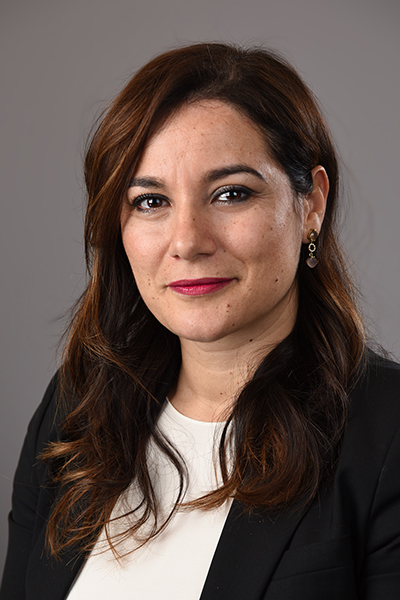5 Questions with Fabiana Perna, M.D.
 Fabiana Perna, M.D., Ph.D., is an associate professor at IU School of Medicine and an associate member of the Hematopoiesis & Hematologic Malignancies research program at the IU Simon Comprehensive Cancer Center. Her research focuses on developing novel immunotherapy by investigating the cancer cell surface proteome. Earlier this year, she was awarded a grant from IU School of Medicine and a one-year, $100,000 grant for new investigators from the Leukemia Research Foundation.
Fabiana Perna, M.D., Ph.D., is an associate professor at IU School of Medicine and an associate member of the Hematopoiesis & Hematologic Malignancies research program at the IU Simon Comprehensive Cancer Center. Her research focuses on developing novel immunotherapy by investigating the cancer cell surface proteome. Earlier this year, she was awarded a grant from IU School of Medicine and a one-year, $100,000 grant for new investigators from the Leukemia Research Foundation.
 Q: What can you tell us about your research?
Q: What can you tell us about your research?
Immunotherapy is a promising approach for cancer treatment. We investigate how genetic and epigenetic aberrations that frequently recur in cancer affect the cancer surface, thus providing targets promoting cancer development, and for use of immunotherapy. Identifying biologically and therapeutically relevant targets is critical to ensure effective and safe therapies. My lab utilizes advanced mass-spectrometry methodologies and integrative bioinformatics tools to probe the cancer surface for candidate molecules of interest and primary patient samples as well as mouse models to define the function of such candidates. These studies serve to understand the molecular underpinnings of cancer development and may lead to a more precise development of therapies based on the immune system.
Q: How did you become interested in this area of oncology and research?
I have been fortunate to work with leading hematologists from the very early stages of my career to today. When I was a clinical resident in Italy participating in national and international clinical trials, I was always very curious in reading the rationale of those protocols and wondered how one may come up with great ideas that could translate from the bench-side to the bedside. This inspired me to spend time in a research setting and brought me in 2008 to Memorial Sloan Kettering Cancer Center in New York. I had the chance to work with bright peers and mentors and that time had a transformative effect on my career.
The obsession with my research projects combined with the dream of becoming a physician-scientist and one day having my own laboratory was the base of my motivation. During that time, I contributed to seminal studies investigating the role of frequently recurring mutations in leukemia and more recently identifying novel therapeutic targets for chimeric antigen receptors (CAR). Through several awards that I had received, including one from the American Society of Hematology, I met the one-of-a-kind, world-renowned hematology researcher Dr. Hal Broxmeyer. He has been an inspiring mentor to me. His important work over many decades and his wise and honest advice still guide me today. Now I have the opportunity to carry out my research ideas in my lab and hopefully translate them to useful knowledge and therapeutics for patients with hematologic malignancies.
“Through several awards that I had received, including one from the American Society of Hematology, I met the one-of-a-kind, world-renowned hematology researcher Dr. Hal Broxmeyer. He has been an inspiring mentor to me.Dr. Perna
Q: What is the most rewarding part of your work?
People, with no doubt. I love to talk with smart people. I greatly enjoy those intellectually stimulating conversations that leave me thinking about the mysteries of these diseases, inspire me to read more and lead to some cool collaborative work. This is what I miss the most these days when we live in isolation and all the in-person seminars and conferences are canceled or virtual, because of the difficult time brought on by the COVID-19 pandemic.
I also see patients mainly in the Bone Marrow Transplantation Unit of the IU Health Simon Cancer Center. It is such an honor for me to be part of it. I cannot stop thinking about the people I meet every day when on service, some of those patients ask me about my research and I can sense the interest and hope. This surely reinforces my commitment to this work.
Q: What has surprised you about your experiences as a cancer researcher?
It has been an intense year for me as a new principal investigator running my own lab during the pandemic. I have learned many lessons, though:
- I am braver than I thought. Moving to a new city where I didn’t know anyone and starting a new lab from scratch in a new institution takes lots of effort.
- There are colleagues who kindly check on me regularly and offer to help and share their experiences in overcoming challenges. It matters a lot to a new PI. There are other young investigators like me who are willing to work together and support each other. I do need these neighbors.
- Cancer is very smart. It uses fascinating ways to escape targeted therapies. I am thinking in this moment to the spliced CD19 isoform that lacks just the epitope recognized by CAR T cells. It is a means for the cancer cell to hide from engineered T cells that would be able to kill it otherwise.
Q: When you’re not in the lab, how do you like to spend your time?
I have a two-year-old daughter, Emma Grace. I spend most of my time out of the lab with her. We read, we play ball, we do lots of puzzles, we sing and dance, we watch the Nutcracker ballet or listen to my favorite opera music, Cavalleria Rusticana. We also Facetime grandparents in Italy, with the hope to travel soon again.